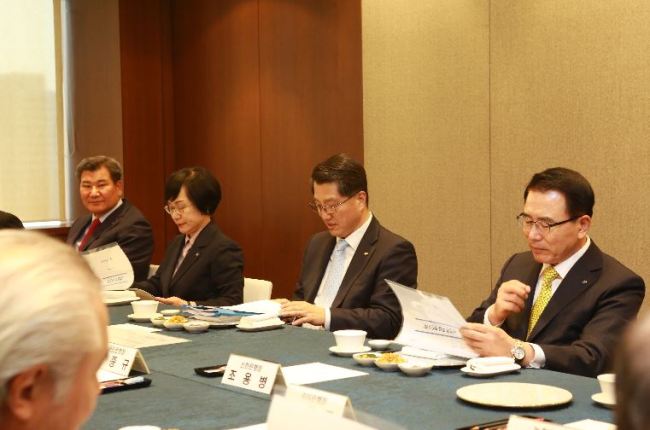The burden of mortgages on households is rapidly increasing as interest rates continue to rise amid growing uncertainties in the global financial market after the US presidential election win by Donald Trump.
According to the banking industry Thursday, interest rates of both fixed and floating mortgages at major commercial banks have risen by more than 0.1 percentage point compared to late October.
KEB Hana Bank’s fixed rate for five-year mortgages rose from between 3.20 and 4.4 percent to between 3.54 and 4.74 percent during the period.

KB Kookmin Bank’s fixed mortgage rate also climbed from between 3.06 and 4.36 percent to between 3.18 and 4.48 percent. At Shinhan Bank, the same rate jumped from between 3.04 and 4.34 percent to between 3.49 and 4.79 percent.
The main reason for the noticeable rate hikes is increased costs for banks to finance funds from the global market. The banks issue five-year debentures to bring in funds for lending. The borrowing rate soared from 1.73 percent in late October to 2.088 percent as of Thursday.
“The bank debenture rate started rising right after the US election,” said a spokesman at KEB Hana Bank. “The rate is directly reflected in local market rates ahead of any changes in the benchmark interest rate.”
At KEB Hana, the country’s largest commercial bank by assets, the interest rate for a mortgage plan for the lowest credit rating group stood at 5.18 percent, far higher than the 4.38 percent for the first-grade group, which suggests greater burdens on low-income or subprime consumers who are in desperate need of mortgages.

South Korean financial authorities have announced efforts to tighten the risk management of household debt in preparation for global financial jitters in the era of the Trump administration.
As part of the efforts, Zhin Woong-seob, governor of the Financial Supervisory Service, convened the chief executive officers of 14 commercial banks Thursday to call for measures to enhance management of household debt-related risks.
“Banks will need to be alert to the recent growth in household lending,” Zhin said. “Rather than expanding lending sales, focus more on enhancing risk management next year.”
From January through October, total household loans rose 8.9 percent from the same period last year. Collective loans jumped 16.2 percent during the same period, according to the FSS.
“The main culprit lies in the government’s policy measures to boost the real estate market, which accelerated growth in collective loans,” said a source from the banking industry. “Banks feel pressured from such an authoritarian urge, because curbing new loan issuances would only disgruntle ordinary consumers.”
Experts say interest rates are now making a turnaround from declining to rising globally.
“With Trump’s win, dominant forecasts say US rate hikes might be faster than expected,” said Kim Ji-seob, an expert at Korea Development Institute. “The Bank of Korea might also follow this track, which may cause mounting burdens on low-income, indebted households.”
By Song Su-hyun (song@heraldcorp.com)





![[Herald Interview] 'Amid aging population, Korea to invite more young professionals from overseas'](http://res.heraldm.com/phpwas/restmb_idxmake.php?idx=644&simg=/content/image/2024/04/24/20240424050844_0.jpg&u=20240424200058)











![[KH Explains] Korean shipbuilding stocks rally: Real growth or bubble?](http://res.heraldm.com/phpwas/restmb_idxmake.php?idx=652&simg=/content/image/2024/04/25/20240425050656_0.jpg&u=)

